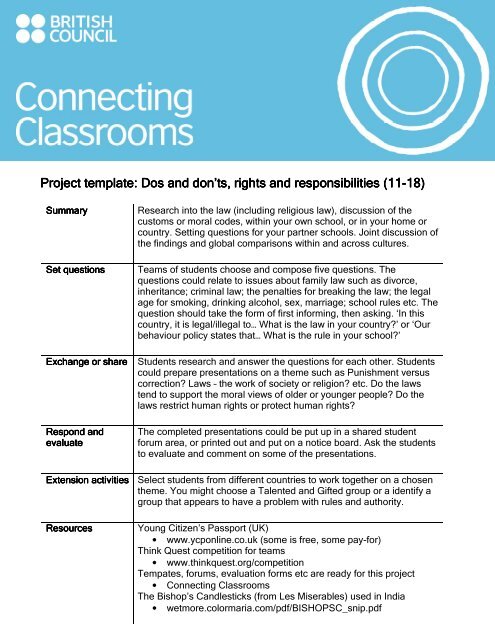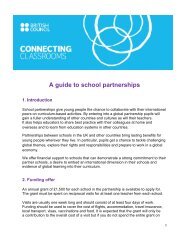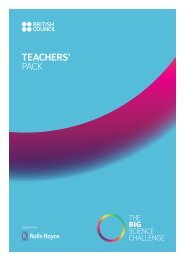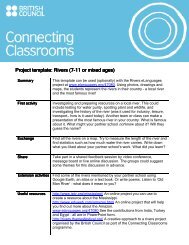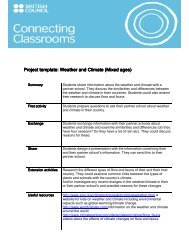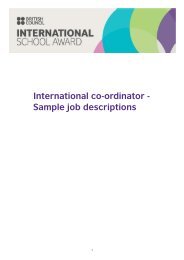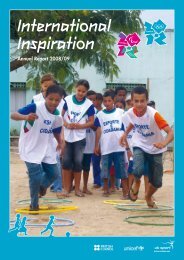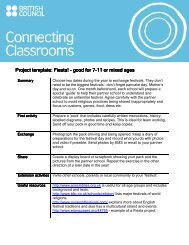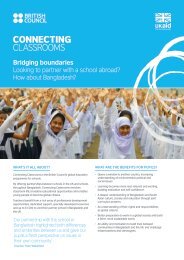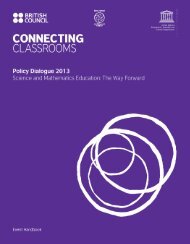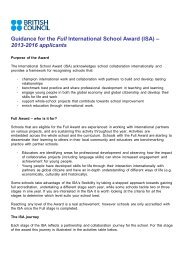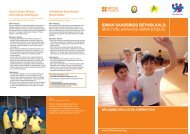Dos and don'ts - British Council Schools Online
Dos and don'ts - British Council Schools Online
Dos and don'ts - British Council Schools Online
You also want an ePaper? Increase the reach of your titles
YUMPU automatically turns print PDFs into web optimized ePapers that Google loves.
Project template: <strong>Dos</strong> <strong>and</strong> don’ts, rights <strong>and</strong> responsibilities (11-18)18)SummarySet questionsResearch into the law (including religious law), discussion of thecustoms or moral codes, within your own school, or in your home orcountry. Setting questions for your partner schools. Joint discussion ofthe findings <strong>and</strong> global comparisons within <strong>and</strong> across cultures.Teams of students choose <strong>and</strong> compose five questions. Thequestions could relate to issues about family law such as divorce,inheritance; criminal law; the penalties for breaking the law; the legalage for smoking, drinking alcohol, sex, marriage; school rules etc. Thequestion should take the form of first informing, then asking. ‘In thiscountry, it is legal/illegal to… What is the law in your country?’ or ‘Ourbehaviour policy states that… What is the rule in your school?’Exchange or share Students research <strong>and</strong> answer the questions for each other. Studentscould prepare presentations on a theme such as Punishment versuscorrection? Laws – the work of society or religion? etc. Do the lawstend to support the moral views of older or younger people? Do thelaws restrict human rights or protect human rights?Respond <strong>and</strong>evaluateThe completed presentations could be put up in a shared studentforum area, or printed out <strong>and</strong> put on a notice board. Ask the studentsto evaluate <strong>and</strong> comment on some of the presentations.Extension activities Select students from different countries to work together on a chosentheme. You might choose a Talented <strong>and</strong> Gifted group or a identify agroup that appears to have a problem with rules <strong>and</strong> authority.ResourcesYoung Citizen’s Passport (UK)• www.ycponline.co.uk (some is free, some pay-for)Think Quest competition for teams• www.thinkquest.org/competitionTempates, forums, evaluation forms etc are ready for this project• Connecting ClassroomsThe Bishop’s C<strong>and</strong>lesticks (from Les Miserables) used in India• wetmore.colormaria.com/pdf/BISHOPSC_snip.pdf
Joint Curriculum Project NotesProject: <strong>Dos</strong> <strong>and</strong> Don’ts (ages(11-1818)Aims <strong>and</strong> Outcomes: This project invites students to find out about the laws, customs <strong>and</strong> moralcodes that exist within their country <strong>and</strong> of their partner school. They discuss <strong>and</strong> share informationwith their partner school <strong>and</strong> then prepare presentations of their findings, making global comparisonswithin <strong>and</strong> across cultures.UK Curriculum links:Citizenship key stage 3This project ties in with the key concept of Citizenship at Key Stage 3.1.1 Democracy <strong>and</strong> JusticeWeighing up what is fair <strong>and</strong> unfair in different situations, underst<strong>and</strong>ing that justice is fundamental toa democratic society <strong>and</strong> exploring the role of law in maintaining order <strong>and</strong> resolving conflict.1.2 Rights <strong>and</strong> ResponsibilitiesExploring different kinds of rights <strong>and</strong> obligations <strong>and</strong> how these affect both individuals <strong>and</strong>communities.Key Concepts of Religious Education in key stage 3This project also ties in with the key concept of Religious Education at Key Stage 3.1.6 Values <strong>and</strong> commitmentsUnderst<strong>and</strong>ing how moral values <strong>and</strong> a sense of obligation can come from beliefs <strong>and</strong> experience.
Cross-curriculum dimensions:The ‘<strong>Dos</strong> <strong>and</strong> Don’ts’ project engages students in the following cross-curricular dimensions:Identity <strong>and</strong> diversityStudents are invited to underst<strong>and</strong> the importance of human rights <strong>and</strong> the consequences of intolerance<strong>and</strong> discrimination, <strong>and</strong> know how to challenge these.They also invited to critically reflect on the shared <strong>and</strong> diverse values in society.They are given the opportunity to communicate with people of different beliefs <strong>and</strong> faiths.Community ParticipationStudents can evaluate the rights <strong>and</strong> responsibilities of people <strong>and</strong> groups within communities <strong>and</strong> in thecontext of the issues they are taking action on.Global dimension <strong>and</strong> sustainable developmentStudents communicate with people from a range of countries <strong>and</strong> cultures <strong>and</strong> develop selfawareness<strong>and</strong> a positive attitude to difference.Personal, Learning <strong>and</strong> Thinking Skills:The ‘<strong>Dos</strong> <strong>and</strong> Don’ts’ project helps learners develop the following PLTS areas:Team workers: collaborate with others to work towards common goals <strong>and</strong> reach agreements.Self-managers: work towards goals, showing initiative, commitment <strong>and</strong> perseverance.Independent enquirers: analyse <strong>and</strong> evaluate information, judging its relevance <strong>and</strong> value
Key language:Talking about laws <strong>and</strong> rules.Asking questions.Modals for permission, prohibition etc…The English language used in the ‘<strong>Dos</strong> <strong>and</strong> Don’ts’ project can be supported <strong>and</strong> extended throughthe following links from <strong>British</strong> <strong>Council</strong>’s Learning English website:Story <strong>and</strong> follow-up questions about park rules.http://learnenglishkids.britishcouncil.org/en/short-stories/no-dogsPuzzle <strong>and</strong> song for rules of the roadhttp://learnenglishkids.britishcouncil.org/en/songs/stop-look-listen-thinkGame about playground ruleshttp://learnenglishkids.britishcouncil.org/en/language-games/word-2-word/playground-rulesActivity sheet for school ruleshttp://learnenglishkids.britishcouncil.org/en/practise-your-english/school-rules


